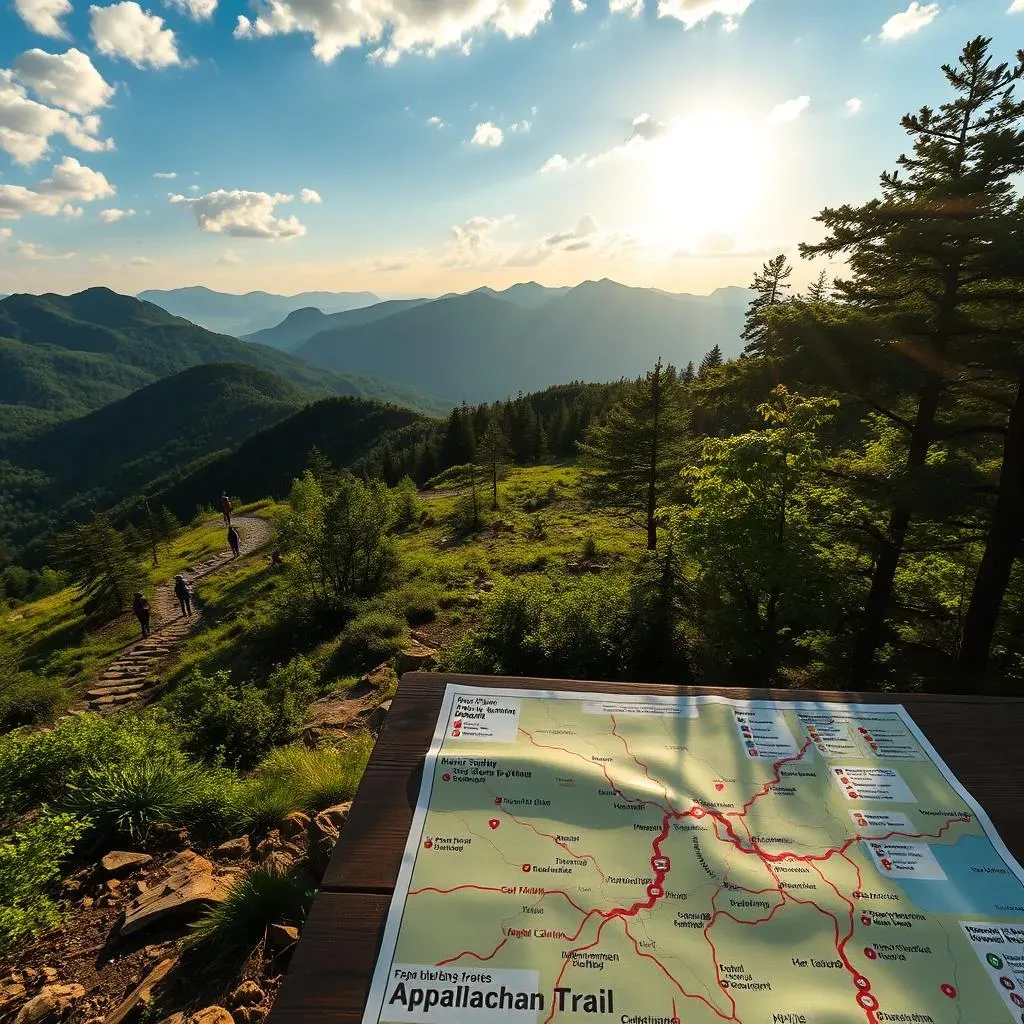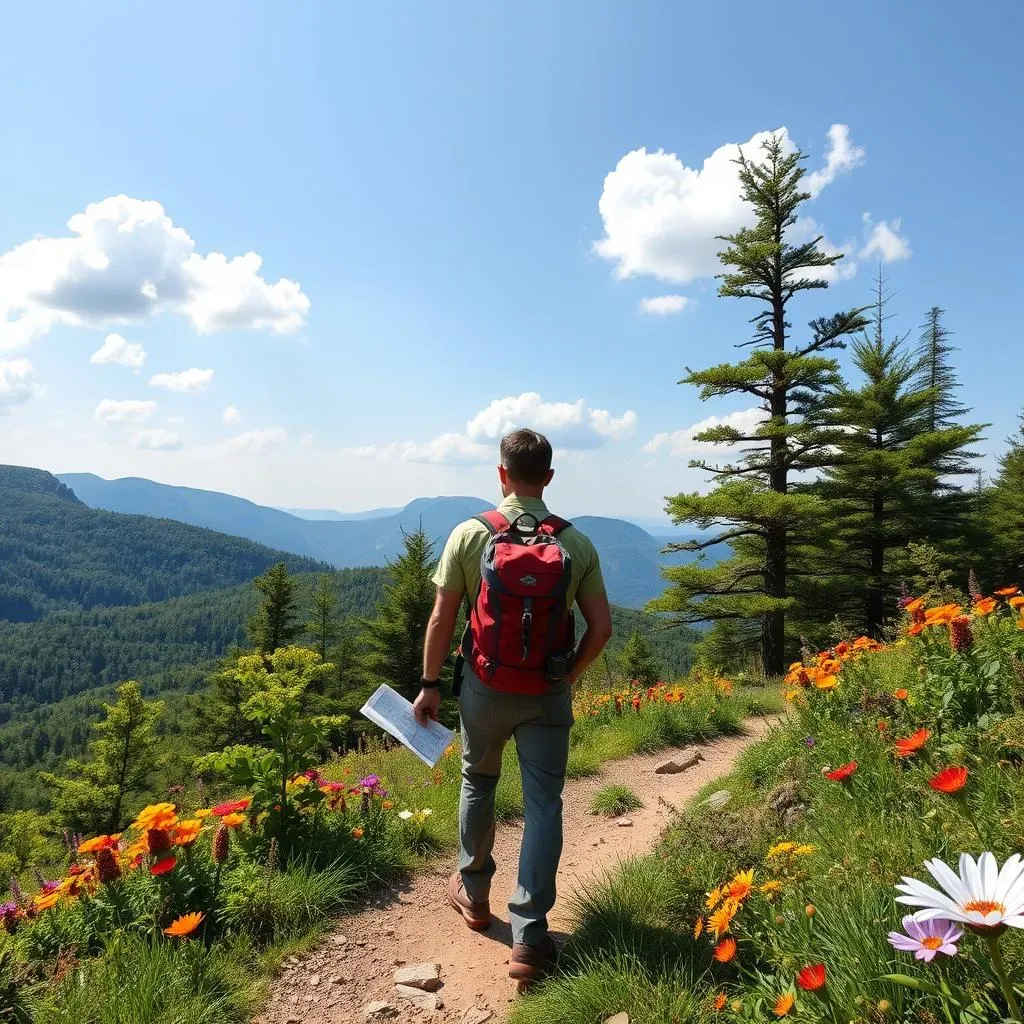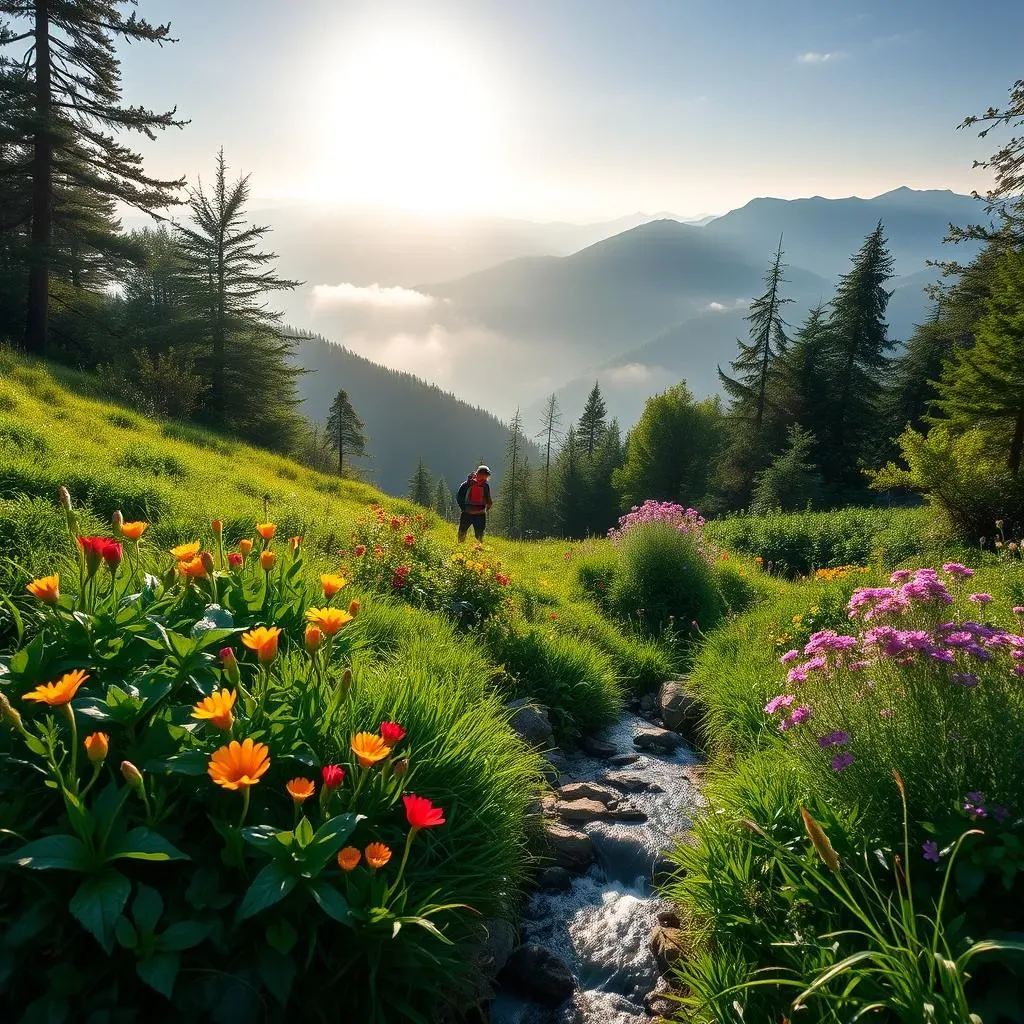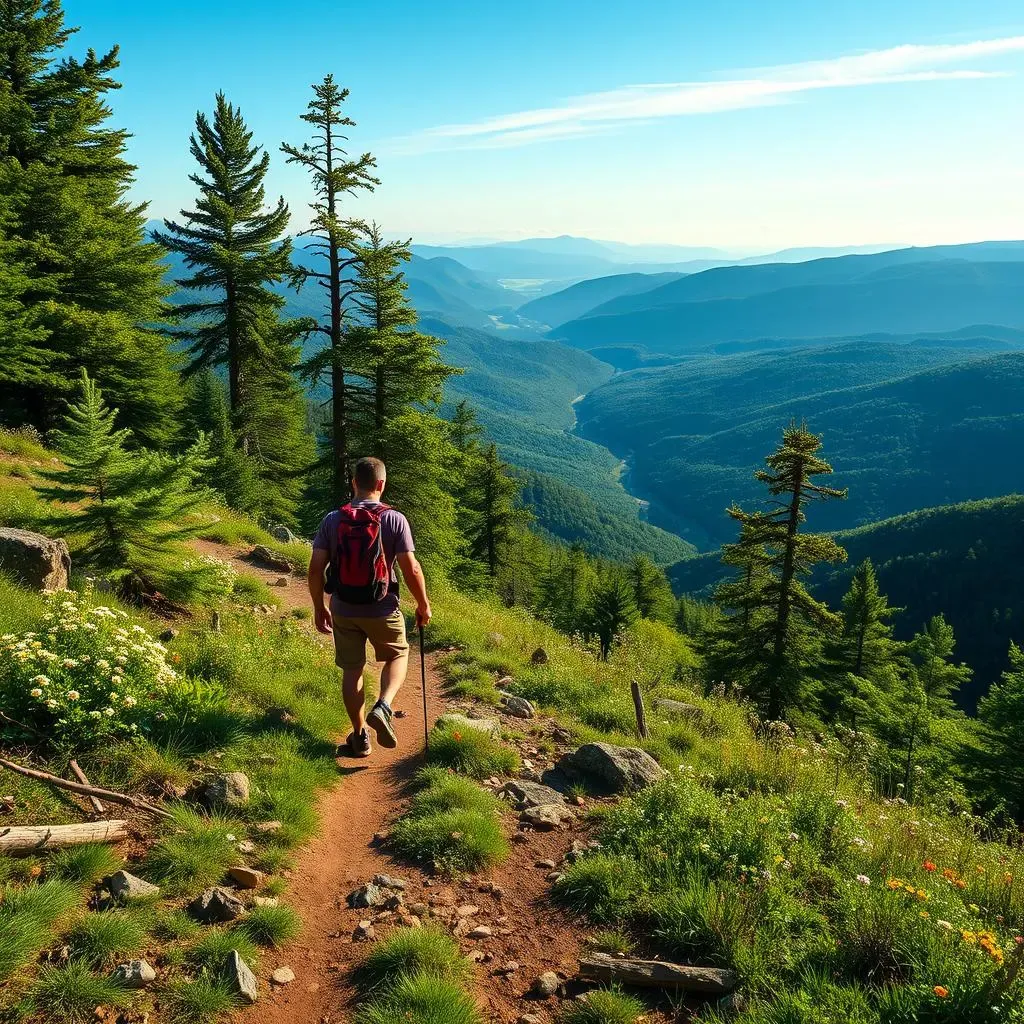Table of Contents
Welcome to the ultimate guide to hiking day trips in the Appalachian Mountains! Whether you're an experienced hiker or just looking for a day of adventure, this article will help you discover the best trails, the best time to hike, and how to plan your trip. The Appalachian Mountains offer a wealth of hiking opportunities, from easy strolls to challenging climbs, and we'll cover it all. Get ready to explore one of America's most beautiful regions and make unforgettable memories on the trail. Whether you're looking for scenic views, wildlife spotting, or just a chance to get outside and enjoy nature, we've got you covered. So pack your backpack, lace up your hiking boots, and let's hit the trail!
Top Hiking Trails in the Appalachian Mountains

Top Hiking Trails in the Appalachian Mountains
Appalachian Trail
The Appalachian Trail is a iconic 2,190-mile-long footpath that stretches from Springer Mountain in Georgia to Mount Katahdin in Maine. It's considered one of the most challenging and rewarding hikes in the world. The trail takes hikers through 14 states and a wide range of landscapes, including forests, mountains, and rural towns. While most hikers take months to complete the entire trail, there are many day hike options along the way that offer stunning views and a taste of the adventure.
One of the most popular day hikes on the Appalachian Trail is the 12-mile round trip to McAfee Knob in Virginia. This challenging hike offers breathtaking views of the surrounding mountains and is considered one of the best day hikes on the entire trail.
Trail Name | Location | Distance |
|---|---|---|
Appalachian Trail to McAfee Knob | Virginia | 12 miles round trip |
Appalachian Trail to Clingmans Dome | Tennessee | 8 miles round trip |
Appalachian Trail to Roan Mountain | North Carolina | 10 miles round trip |
Great Smoky Mountains National Park
The Great Smoky Mountains National Park is a world-renowned hiking destination, with over 800 miles of trails to explore. The park offers a wide range of day hike options, from easy strolls to challenging climbs.
One of the most popular day hikes in the park is the 10-mile round trip to Mount LeConte. This challenging hike offers stunning views of the surrounding mountains and takes hikers through a variety of landscapes, including forests and wildflower-filled meadows.
- Alum Cave Trail to Mount LeConte
- Laurel Falls Trail to Laurel Falls
- Chimney Tops Trail to Chimney Tops
Blue Ridge Parkway
The Blue Ridge Parkway is a 469-mile scenic road that runs through the Blue Ridge Mountains of North Carolina and Virginia. The parkway offers a wide range of day hike options, from easy strolls to challenging climbs.
One of the most popular day hikes along the parkway is the 4-mile round trip to Linville Gorge. This moderate hike offers stunning views of the surrounding mountains and takes hikers through a variety of landscapes, including forests and rocky outcroppings.
Trail Name | Location | Distance |
|---|---|---|
Linville Gorge Trail | North Carolina | 4 miles round trip |
Grandfather Mountain Trail | North Carolina | 6 miles round trip |
Mount Mitchell Trail | North Carolina | 8 miles round trip |
Best Time to Hike in the Appalachian Mountains

Best Time to Hike in the Appalachian Mountains
The Best Seasons for Hiking
The best time to hike in the Appalachian Mountains depends on your personal preferences and the type of hike you're looking for. Generally, spring and fall are considered the best seasons for hiking in the Appalachian Mountains due to the mild weather and beautiful scenery. During these seasons, the temperatures are usually in the 60s and 70s (15-26°C), with minimal precipitation.
Summer can be a great time to hike in the higher elevations, where the temperatures are cooler and the wildflowers are in bloom. However, it's also the peak tourist season, so expect more crowds and higher prices for accommodations.
Season | Temperatures | Precipitation |
|---|---|---|
Spring (March to May) | 60-70°F (15-21°C) | Minimal |
Summer (June to August) | 70-80°F (21-27°C) | Higher |
Fall (September to November) | 50-60°F (10-15°C) | Minimal |
Winter (December to February) | 30-40°F (-1 to 4°C) | Higher |
Best Time for Specific Hikes
Some hikes in the Appalachian Mountains are best done during specific seasons. For example, the Appalachian Trail is best hiked in the spring and fall, when the weather is mild and the wildflowers are in bloom. The higher elevation hikes, such as those in the Great Smoky Mountains National Park, are best done in the summer, when the temperatures are cooler and the wildflowers are in bloom.
Winter can be a great time to hike in the lower elevations, where the snow is minimal and the scenery is peaceful. However, it's important to be prepared for colder temperatures and potential snow and ice on the trails.
- Spring: Appalachian Trail, Great Smoky Mountains National Park
- Summer: Higher elevation hikes, wildflowers in bloom
- Fall: Foliage, cooler temperatures
- Winter: Lower elevation hikes, peaceful scenery
Plan Your Hike
Regardless of the season, it's important to plan your hike carefully. Check the weather forecast and trail conditions before you go, and pack accordingly. Bring plenty of water, snacks, and layers, as the weather can change quickly in the mountains.
Consider bringing a map and compass, as well as a GPS device or smartphone with a GPS app. It's also a good idea to bring a first aid kit and know how to use the items in it.
Item | Why |
|---|---|
Map and compass | To navigate the trails |
GPS device or smartphone with GPS app | To navigate the trails |
First aid kit | In case of emergencies |
Water and snacks | To stay hydrated and energized |
Layers | To stay warm and comfortable |
Plan Your Hiking Day Trip in the Appalachian Mountains

Plan Your Hiking Day Trip in the Appalachian Mountains
Research the Trail
Before you head out on your hiking day trip, it's essential to research the trail you plan to hike. This will help you understand the trail's difficulty level, length, and any potential hazards you may encounter.
Start by checking out online resources like the Appalachian Trail website or the National Park Service website for the park you plan to visit. These websites often have detailed trail information, including maps, elevation profiles, and trail descriptions.
It's also a good idea to read reviews and trail reports from other hikers to get a sense of the trail's current conditions and any challenges you may face. Websites like TrailLink and HikingUpward are excellent resources for this type of information.
Resource | Information Provided |
|---|---|
Appalachian Trail website | Trail maps, elevation profiles, trail descriptions |
National Park Service website | Trail maps, elevation profiles, trail descriptions |
TrailLink | Trail reviews, trail reports |
HikingUpward | Trail reviews, trail reports |
Check the Weather
It's crucial to check the weather forecast before you head out on your hike. This will help you prepare for any potential weather conditions and ensure your safety on the trail.
Check the National Weather Service website for the most up-to-date weather forecast for the area you plan to hike in. You can also check websites like Weather Underground or AccuWeather for more detailed forecasts.
Be sure to pack accordingly based on the weather forecast. If there's a chance of rain, bring a rain jacket and rain pants. If it's going to be hot, bring plenty of water and consider bringing a sun hat or umbrella.
- National Weather Service website
- Weather Underground
- AccuWeather
Pack the Right Gear
Having the right gear is essential for a safe and enjoyable hiking day trip. Here are some essential items to bring along:
Water: Bring at least 2-3 liters of water per person, depending on the length and difficulty of the hike. Snacks: Bring energy-rich snacks like nuts, dried fruit, and jerky. Map and compass: Even if you have a GPS device, it's always a good idea to bring a map and compass as a backup. First aid kit: A basic first aid kit should include items like bandages, antiseptic wipes, and pain relievers. Extra layers: Even if it's warm at the trailhead, it can get cold at higher elevations, so bring extra layers. Sunscreen and insect repellent: Protect yourself from the sun and insects with SPF 30 or higher sunscreen and DEET-based insect repellent.
Item | Why |
|---|---|
Water | Stay hydrated |
Snacks | Keep energy levels up |
Map and compass | Navigate the trail |
First aid kit | Treat minor injuries |
Extra layers | Stay warm |
Sunscreen and insect repellent | Protect against sun and insects |
Explore the Appalachian Mountains on a Guided Hike

Explore the Appalachian Mountains on a Guided Hike
Discover the Best Guided Hike Options in the Appalachian Mountains
Exploring the Appalachian Mountains on a guided hike is a fantastic way to experience the natural beauty of this incredible region. With expert guides leading the way, you can focus on taking in the breathtaking views, learning about the area's history and ecology, and enjoying the thrill of hiking in one of the most stunning mountain ranges in the world.
There are numerous guided hike options to choose from in the Appalachian Mountains, ranging from easy day hikes to more challenging multi-day backpacking trips. Some popular options include guided hikes in the Great Smoky Mountains National Park, the Blue Ridge Parkway, and the Appalachian Trail. Each of these locations offers unique hiking experiences and opportunities to spot wildlife, take in spectacular views, and explore the region's rich cultural heritage.
Guided Hike Location | Difficulty Level | Distance |
|---|---|---|
Great Smoky Mountains National Park | Easy to challenging | 5-20 miles |
Blue Ridge Parkway | Easy to moderate | 2-10 miles |
Appalachian Trail | Challenging | 10-50 miles |
Benefits of Guided Hikes in the Appalachian Mountains
Joining a guided hike in the Appalachian Mountains offers numerous benefits, including:
Expert knowledge: Guides are knowledgeable about the area's history, ecology, and geology, providing a richer hiking experience.
Safety: Guides are experienced in wilderness first aid and know how to handle emergencies, ensuring a safe hiking experience.
Logistical support: Guides handle logistics, such as transportation and accommodations, allowing you to focus on the hike.
Access to off-the-beaten-path trails: Guides often know lesser-known trails and can take you to hidden gems that you might not find on your own.
Social experience: Guided hikes provide an opportunity to meet new people and make friends who share your passion for hiking and nature.
- Expert knowledge
- Safety
- Logistical support
- Access to off-the-beaten-path trails
- Social experience
How to Choose the Right Guided Hike for You
When selecting a guided hike in the Appalachian Mountains, consider the following factors:
Difficulty level: Choose a hike that matches your fitness level and experience.
Distance: Decide how far you want to hike and choose a trip that fits your schedule.
Interests: Consider what you want to see or experience on your hike, such as wildlife, waterfalls, or historic sites.
Cost: Guided hikes can range from budget-friendly to expensive, so set a budget and choose a trip that fits within it.
Reviews: Research the guide service and read reviews from past customers to ensure you're choosing a reputable and high-quality guided hike.
Check for best nature day trips in Colorado and best waterfalls for day trips in the US!
Factor | Considerations |
|---|---|
Difficulty level | Choose a hike that matches your fitness level and experience |
Distance | Decide how far you want to hike and choose a trip that fits your schedule |
Interests | Consider what you want to see or experience on your hike |
Cost | Set a |
